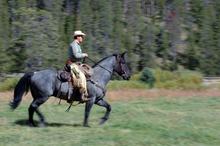Back Country Horsemen of America cherishes our wild lands and they make sure that everything they do has the lowest impact possible on the land and the environment. That’s one reason they love horses and mules.

Using horse power to conserve endangered woodland
Back Country Horsemen of America cherishes our wild lands and they make sure that everything they do has the lowest impact possible on the land and the environment.
Horse power is irreplaceable in the many public lands where motorized use is prohibited, such as the Bass Lake area in the Sierra National Forest, and the Idaho Panhandle National Forests where the endangered woodland caribou makes a last stand.
These precious places need protecting, but our enjoyment of these areas necessitates occasional trail improvements. The predicament is easily solved with the use of the original horse power.
Re-Furnishing an historic structure
The Selkirk Valley Chapter of Back Country Horsemen of Idaho recently used horses and mules to complete two packing assignments for the US Forest Service in the Idaho Panhandle National Forests, without once violating the “no motorized use” rule.
West Fork Cabin, an historic reconstructed smoke-jumpers’ cabin, sits in a small meadow about a mile and a half from a forest service road. Originally built in 1931, it is open to the public for shelter and overnight stays. Because it sees heavy use, many things needed to be replaced.
Members of the Selkirk Valley Chapter of BCHI gathered at the trailhead and secured the awkward items on their pack stock. One pack animal carried a 150 pound wood stove and 150 pounds of water on the other side to even out the load. Another carried bunk bed frames, while two others were loaded with three mattresses. The last carried a variety of miscellaneous items.
When the motley-looking crew arrived at West Fork Cabin, the surprised resident campers helped Selkirk Valley BCH replace the old items with the new. After a brief visit, they packed the horses and mules with the old items and returned to the trailhead, accomplishing an essential job with a minimum impact on the land.
In the name of science
When the Sandpoint Ranger District in the Idaho Panhandle National Forests received a grant to conduct a study on white bark pine on Keno Mountain, they asked the Selkirk Valley Chapter of Back Country Horsemen of Idaho to pack in and out the necessary equipment. In July, they packed all the gear to the top of Keno Mountain. After equipment was put in place to harvest pinecone seeds in the trees, Selkirk Valley BCH packed the gear out. After the harvest, they will repeat the process to bring down the equipment and harvested seeds.
The Selkirk Valley Chapter of Back Country Horsemen of Idaho look forward to doing whatever they can to maintain local forests. They clear trails, tidy trailheads, assist with scientific studies, and pack in and out a wide variety of equipment and materials using the original horse power, which treads lightly on the land.
Having a blast
Partnering with the Bass Lake Ranger District, the Sierra Freepackers Chapter of Back Country Horsemen of California repaired a section of the Spring Cove Trail at Bass Lake in the Sierra National Forest. Their goal was to bring it up to acceptable standards by widening the trail, which required blasting out some rock that made the trail unsafe for horses.
The Sierra Freepackers used mules to pack in a variety of equipment needed for the project including a specialized pionjar drill, Boulder Busters, and hand tools. The pionjar is a versatile gas powered tool used to drill holes in the rock. Water was added for expansion and the Boulder Buster inserted. A mat was placed over the blast holes for safety and to keep flying debris to a minimum. As rock was broken up, BCHC members cleared the pieces from the trail.
After the project was completed, two BCHC members came back a couple of days later and rode the trail with some novice riders to evaluate the work from horseback. Thanks to the hard work of the Sierra Freepackers and their low impact horse power, the trail was successfully improved without causing damage to the surrounding land.
About Back Country Horsemen of America
BCHA is a non-profit corporation made up of state organizations, affiliates, and at-large members. Their efforts have brought about positive changes regarding the use of horses and stock in the wilderness and public lands.
by Sarah Wynne Jackson
